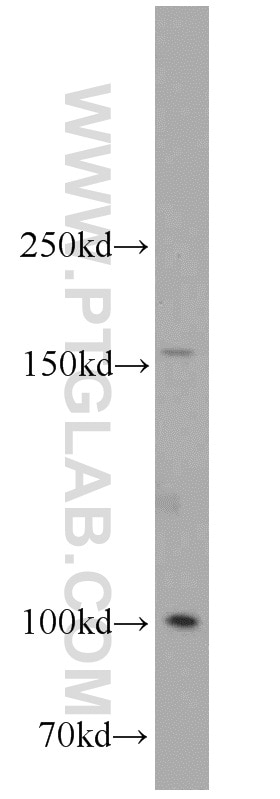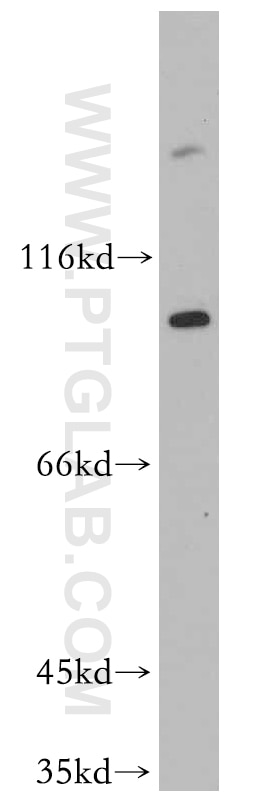Tested Applications
| Positive WB detected in | mouse spleen tissue, mouse colon tissue |
Recommended dilution
| Application | Dilution |
|---|---|
| Western Blot (WB) | WB : 1:200-1:1000 |
| It is recommended that this reagent should be titrated in each testing system to obtain optimal results. | |
| Sample-dependent, Check data in validation data gallery. | |
Product Information
20231-1-AP targets ITGA6X1A in WB, ELISA applications and shows reactivity with human, mouse samples.
| Tested Reactivity | human, mouse |
| Host / Isotype | Rabbit / IgG |
| Class | Polyclonal |
| Type | Antibody |
| Immunogen |
Peptide Predict reactive species |
| Full Name | integrin, alpha 6 |
| Calculated Molecular Weight | 127 kDa |
| Observed Molecular Weight | 100 kDa, 150 kDa |
| GenBank Accession Number | NM_000210 |
| Gene Symbol | Integrin alpha 6 |
| Gene ID (NCBI) | 3655 |
| RRID | AB_10665420 |
| Conjugate | Unconjugated |
| Form | Liquid |
| Purification Method | Antigen affinity purification |
| UNIPROT ID | P23229 |
| Storage Buffer | PBS with 0.02% sodium azide and 50% glycerol, pH 7.3. |
| Storage Conditions | Store at -20°C. Stable for one year after shipment. Aliquoting is unnecessary for -20oC storage. 20ul sizes contain 0.1% BSA. |
Background Information
ITGA6, also named as CD49f and VLA-6, belongs to the integrin alpha chain family. It is a receptor for laminin on platelets. ITGA6 is a receptor for laminin in epithelial cells and it plays a critical structural role in the hemidesmosome. Defects in ITGA6 are a cause of epidermolysis bullosa letalis with pyloric atresia (EB-PA) which also known as junctional epidermolysis bullosa with pyloric atresia (PA-JEB) or aplasia cutis congenita with gastrointestinal atresia. The antibody is specific to isoform Alpha-6X1A, isoform Alpha-6X2A, isoform Alpha-6X1X2A isoform7 and isoform9 of ITGA6.
Protocols
| Product Specific Protocols | |
|---|---|
| WB protocol for ITGA6X1A antibody 20231-1-AP | Download protocol |
| Standard Protocols | |
|---|---|
| Click here to view our Standard Protocols |






